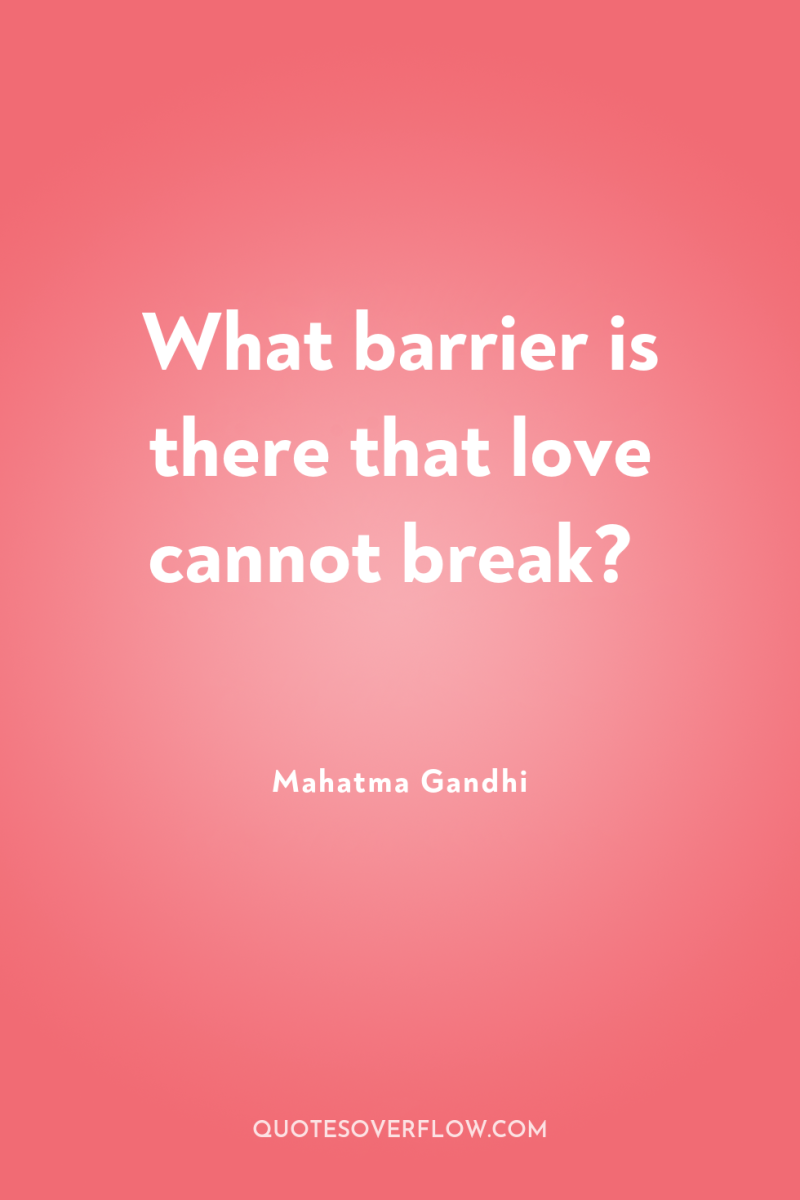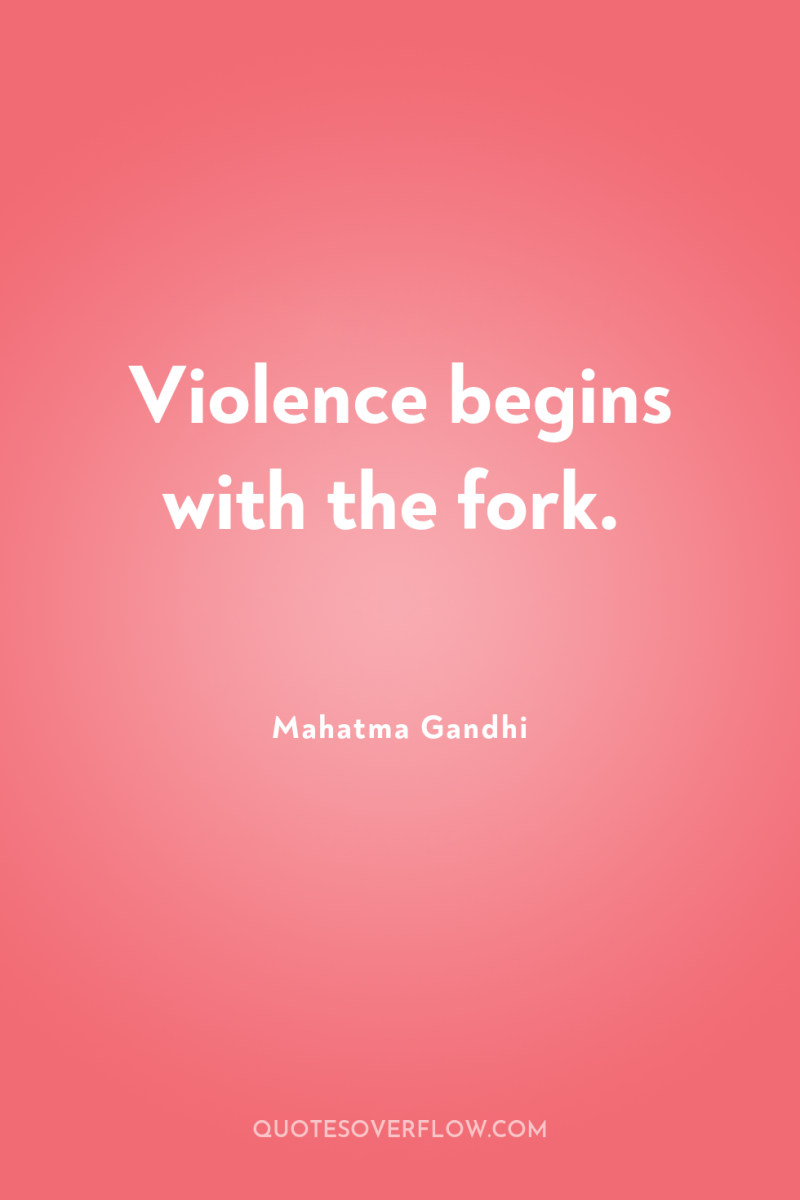
1
What barrier is there that love cannot break?Mahatma Gandhi

2
Violence begins with the fork.Mahatma Gandhi
3
If one is not a meditator, howsoever good one is it is all useless.Osho
4
Men, I say, but better to call them human spiders that go crawling in between and under the tables with rags in their hands, ...crushed humans, Readers choice of relevant quotes about MK Gandhi and Satyagraha.Kathy Richardson
5
Gandhi is an example of a man who grew from being self-centered as he was learning to become a lawyer in England, to becoming more family- and social oriented in South-Africa, where he led a reformation of Indian rights, to becoming determined in helping his nation recover from British rule at which he succeeded in the end with the help of a great many people. At the end of his life Gandhi was increasingly focused on a larger picture, encasing the whole world in his vision of a peaceful future.Gudjon Bergmann
6
I can retain neither respect nor affection for government which has been moving from wrong to wrong in order to defend its immoralityMahatma Gandhi
7
There would be nothing to frighten you if you refused to be afraid.Mahatma Gandhi
8
On Gandhi: Don’t ever forget, that we were not lead by a saint with his head in clouds, but by a master tactician with his feet on the ground.Shashi Tharoor
9
Go to the tea shop anywhere along the Ganga, sir, and look at the men working in that tea shop - men, I say, but better to call them human spiders that go crawling in between and under the tables with rags in their hands, crushed humans in crushed uniforms, sluggish, unshaven, in their thirties or forties or fifties but still "boys." But that is your fate if you do your job well - with honesty, dedication, and sincerity, the way Gandhi would have done it, no doubt.Aravind Adiga
10
In the very first month of Indian Opinion, I realized that the sole aim of journalism should be service. The newspaper press is a great power, but just as an unchained torrent of water submerges whole countrysides and devastates crops, even so an uncontrolled pen serves but to destroy. If the control is from without, it proves more poisonous than want of control. It can be profitable only when exercised from within. If this line of reasoning is correct, how many of the journals in the world would stand the test? But who would stop those that are useless? And who should be the judge? The useful and the useless must, like good and evil generally, go on together, and man must make his choice.Mahatma Gandhi
11
Gandhi said that whatever you do in life will be insignificant, but it's very important that you do it, because nobody else will. I tend to agree with the first part.Will Fetters
12
Close friendships, Gandhi says, are dangerous, because “friends react on one another” and through loyalty to a friend one can be led into wrong-doing. This is unquestionably true. Moreover, if one is to love God, or to love humanity as a whole, one cannot give one's preference to any individual person. This again is true, and it marks the point at which the humanistic and the religious attitude cease to be reconcilable. To an ordinary human being, love means nothing if it does not mean loving some people more than others. The autobiography leaves it uncertain whether Gandhi behaved in an inconsiderate way to his wife and children, but at any rate it makes clear that on three occasions he was willing to let his wife or a child die rather than administer the animal food prescribed by the doctor. It is true that the threatened death never actually occurred, and also that Gandhi – with, one gathers, a good deal of moral pressure in the opposite direction – always gave the patient the choice of staying alive at the price of committing a sin: still, if the decision had been solely his own, he would have forbidden the animal food, whatever the risks might be. There must, he says, be some limit to what we will do in order to remain alive, and the limit is well on this side of chicken broth. This attitude is perhaps a noble one, but, in the sense which – I think – most people would give to the word, it is inhuman. The essence of being human is that one does not seek perfection, that one is sometimes willing to commit sins for the sake of loyalty, that one does not push asceticism to the point where it makes friendly intercourse impossible, and that one is prepared in the end to be defeated and broken up by life, which is the inevitable price of fastening one's love upon other human individuals. No doubt alcohol, tobacco, and so forth, are things that a saint must avoid, but sainthood is also a thing that human beings must avoid. There is an obvious retort to this, but one should be wary about making it. In this yogi-ridden age, it is too readily assumed that “non-attachment” is not only better than a full acceptance of earthly life, but that the ordinary man only rejects it because it is too difficult: in other words, that the average human being is a failed saint. It is doubtful whether this is true. Many people genuinely do not wish to be saints, and it is probable that some who achieve or aspire to sainthood have never felt much temptation to be human beings. If one could follow it to its psychological roots, one would, I believe, find that the main motive for “non-attachment” is a desire to escape from the pain of living, and above all from love, which, sexual or non-sexual, is hard work. But it is not necessary here to argue whether the other-worldly or the humanistic ideal is “higher”. The point is that they are incompatible. One must choose between God and Man, and all “radicals” and “progressives”, from the mildest Liberal to the most extreme Anarchist, have in effect chosen Man. .George Orwell
13
Wherever Gandhi went, he transformed situations and lives. As one friend and biographer wrote, "He...changed human beings by regarding them not as what they thought they were but as though they were what they wished to be, and as though the good in them was all of themBenjamin Hoff
14
My aim is not to be consistent with my previous statements on a given question, but to be consistent with truth as it may present itself to me at a given moment. The result has been that I have grown from truth to truth.Mahatma Gandhi
15
One should not think of embracing another religion before one had fully understand his own.Mahatma Gandhi
16
[Nicholson] Baker can't seem to get enough of the wisdom of Gandhi and cites at length an open letter he wrote to the British people on 3 July 1940. "Your soldiers are doing the same work of destruction as the Germans, " wrote the Mahatma. "I want you to fight Nazism without arms." He went on to say: "Let them take possession of your beautiful island, with your many beautiful buildings. You will give all these, but neither your souls, nor your minds. If these gentlemen choose to occupy your homes, you will vacate them. If they do not give you free passage out, you will allow yourself, man, woman and child, to be slaughtered, but you will refuse to owe allegiance to them." I must say that everything in me declines to be addressed in that tone of voice .Christopher Hitchens
17
On the occasion of Mahatma Gandhi's birthday, I salute every individual who honors the core values of his legacy, making him proud of humanity.Widad Akreyi
18
Gujarat is my home state, welcome to the land of Krishna, Gandhi, Sardar & now it's NarendrabhaiUnknown
19
Even Mahatma Gandhi - hardly a comfortable character - always wore a bowler hat with his loin cloth when practising as a barrister in London.William Donaldson